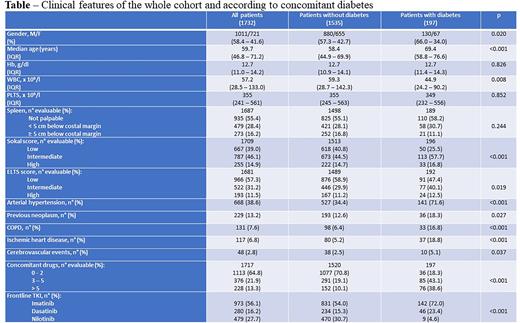Abstract
Background Tyrosine kinase inhibitors (TKIs) have dramatically changed the treatment of chronic myeloid leukemia (CML). Most of data on the TKIs safety derive from sponsored controlled trials, where patients with multiple comorbidities had fewer opportunities to be included. Many questions about the management of newly diagnosed CML can only be answered by analysing large cohorts in real world practice.
Methods To evaluate the choice of TKI and the incidence of early events during the 1st year of therapy in newly diagnosed chronic phase CML patients with concomitant diabetes, we retrospectively studied 1732 CP-CML patients diagnosed from 1/2012 to 12/2019 at 33 Italian Hematology Centres and treated with frontline imatinib (IM) or second-generation TKIs (2G). Among these, 197 patients (11.4%) had concomitant diabetes.
Results The main clinical features at diagnosis of the entire cohort and in patients with diabetes are reported in the Table. Compared with non-diabetic patients, subjects with diabetes were older, had higher Sokal and ELTS scores (Sokal intermediate + high 74.5% vs 59.2%, ELTS intermediate + high 62.6% vs 41.1%) and were more likely affected by other comorbidities as arterial hypertension, COPD, ischemic heart disease/cerebrovascular events and previous neoplasms: as a consequence, diabetic patients reported a higher number of concomitant drugs (> 5 in 38.6% vs 10.1%, p<0.001). The number of white blood cells at diagnosis was lower in diabetic patients (44.9x109/l vs 59.3 x109/l, p=0.008)). Significant differences were observed in the choice of frontline TKI: comparing diabetic with non-diabetic patients, IM was prescribed in 72% vs 54%, dasatinib in 23.4% vs 15.3% and nilotinib in 4.6% vs 30.7% of cases (p<0.001). There were 51 early events (25.9%) in the 1st year of treatment leading to permanent frontline TKI discontinuation in the diabetic patients, compared to 285 (18.7%) in non-diabetic patients (p=0.037). One-year cumulative incidence of TKI permanent discontinuation was 25.9% (95%CI 19.8 - 32.0) in diabetic patients compared to 18.5% (95%CI 16.6 - 20.4) in non-diabetic patients (p=0.015).
Conclusions This real-world study on over 1700 CML patients shows that concomitant diabetes is an important factor in newly diagnosed CML patients, affecting both the clinical presentation and the frontline treatment choice: in addition, concomitant diabetes is linked to a high incidence of early events and frontline TKI permanent discontinuation.
Disclosures
Elena:Novartis: Membership on an entity's Board of Directors or advisory committees; Gilead: Membership on an entity's Board of Directors or advisory committees; Blueprint: Membership on an entity's Board of Directors or advisory committees. Binotto:Novartis, BMS, Incyte, Pfizer: Honoraria. Crugnola:Amgen: Speakers Bureau; Novartis: Speakers Bureau. Stagno:Celgene, Incyte, Novartis, Pfizer: Honoraria, Speakers Bureau. Iurlo:Novartis, BMS, Celgene, Incyte, Pfizer: Honoraria. Galimberti:Abbvie Incyte, Novartis, Janssen, Astrazeneca, Pfizer: Honoraria. Saglio:Novartis: Speakers Bureau. Breccia:Novartis, Incyte, Pfizer, BMS, Abbvie: Honoraria. Latagliata:Novartis: Honoraria; BMS: Honoraria.
Author notes
Asterisk with author names denotes non-ASH members.


This feature is available to Subscribers Only
Sign In or Create an Account Close Modal